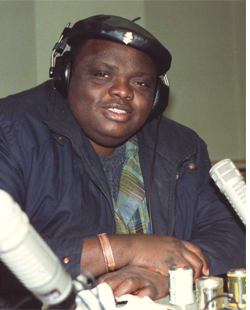 Pepe Kalle Pepe Kalle
1951 - 1998
The elephant has fallen. Ponderous Pepe Kalle, the giant man with the gentle soul and generous gift for rhyme and rhythm died in Kinshasa early Sunday morning November 29. The cause was officially described as a heart attack. According to wire service reports, the 46 year-old Kalle, the first among equals of the group Empire Bakuba, was stricken around 10 p.m. Saturday night at his home in the Congolese capital. He was rushed to the nearby Clinique Ngaliema where he died just after midnight.
As one of the Democratic Republic of the Congo’s biggest stars, both in physical size and personal popularity, Jean Kabasele Yampanya “Pepe Kalle” had endeared himself to the generation of fans who came of age with Congolese “youth bands.” Such bands—the most popular were Zaiko Langa Langa and Orchestre Bella Bella—formed in the late sixties and early seventies as a youthful alternative to older groups like African Fiesta and O.K. Jazz which had pioneered the Congolese rumba.
Pepe Kalle joined the youth movement in a neighborhood band called African Choc where he began to refine his powerful singing voice. With help from Afrisa drummer Seskain Molenga, Kalle embarked on a professional career in 1972 at the age of 20 in the employ of Kiamuangana Mateta, the producer known as Verckys. At Verckys’s Editions Vévé, Kalle and others from African Choc played on several recordings with Molenga that were released under the name Las Bakuba.
Kalle also sang backing vocals on recording sessions for various groups in the Vévé stable and joined another young singer, Nyboma Mwan Dido, alongside veteran Soki Vangu in the front line of Orchestra Bella Bella. When Bella Bella bolted from Vévé in 1973, Kalle and Nyboma stayed on to front a new band called Lipua Lipua. Several months later Kalle and singers Matolu Dode “Papy Tex” and Joseph “Dilu” Dilumona left Editions Vévé to form their Orchestre Empire Bakuba.
The new band built its following by bridging the gap between the old and new styles of popular music that washed in relentless waves across Kinshasa. Kalle sang smoothly like the great Joseph Kabasele (no relation) whom he claimed as a mentor. Where groups like Zaiko dropped horns from the lineup, Empire Bakuba usually kept them in. But like the day’s other youth bands Empire Bakuba rocked in comparison to the elders. The quality of its music and its enormous popularity propelled Empire Bakuba into the first ranks of Congolese bands in the early eighties.
Empire Bakuba was prolific in the studio, churning out at least four albums a year throughout the eighties and early nineties. Although Kalle professed to be apolitical, his song “Article 15 Beta Libanga” deftly portrayed the difficult life in Mobutu’s crumbling Zaïre. “Beta libanga,” beat with a stone, that is work hard, “do what you must to live.”
Other Kalle compositions like “Dadou,” which spoke of family problems brought about by an absent father, addressed the vicissitudes of urban life. “Zouké Zouké,” a party song recorded with Nyboma, rollicked at the pace of Paris soukous and Caribbean zouk. Kalle’s embrace of breakneck Paris soukous helped to win its acceptance back home where initial reaction had been decidedly cool.
Kalle worked seriously at his music but was quick to see life’s humorous side. He remarked more than once that he loved contrasts, a predilection that moved him to squeeze his six-foot-something, three-hundred-and-some-pound frame into a Volkswagen Beetle and to hire a dancing dwarf called Emoro to perform with the band. Emoro himself died of a heart attack in 1992.
In an industry where bands seemed to change personnel on a weekly basis, Empire Bakuba distinguished itself as Congolese music’s most stable group. The core trio of singers worked together for nearly 25 years until signs of trouble appeared in 1998. Kalle’s last album, Cocktail, was recorded as a solo while Papy Tax cooled his heels in Brussels and Dilu was said to be working for a Kinshasa bank.
Despite bleak conditions in Zaïre/Congo during Mobutu’s last years and under the faltering regime of Laurent Kabila, Pape Kalle continued to reside in Kinshasa, refusing to join the mass movement of the music’s stars to Europe. “He was the only musician...who never had a problem with anybody,” said Tabu Ley in Kinshasa. “He was the man who could reconcile two musical generations.”
Veteran Congolese journalist Achille Ngoie, who covered Empire Bakuba from its inception, remembered Kalle as a man of the people. As Ngoie told it, Kalle could be on stage in the middle of a song and, seeing a person in the audience he hadn’t seen for years, work a greeting to that person into the song. “He was an extraordinary person. Ha had an elephantine memory.”
Upon his death Kalle received the praises of government ministers and the common people as well. His body lay in state at several locations throughout the city where he lived and worked. More that one million people were reported to have paid their respects at his funeral at the Palais du Peuple and along the funeral procession’s route. Pape Kalle was buried on December 6 at Gombe Cemetery where he joined the growing pantheon of Congolese music stars who died much too young.
© 1999 Gary Stewart
This article first appeared in The Beat, vol. 18 no. 1, 1999.
|

